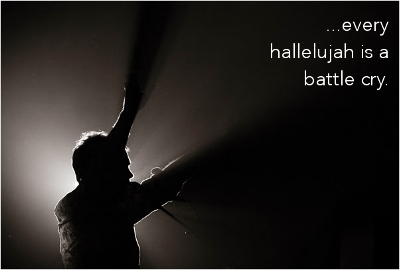Yes, I mean to literally ask, “what do you THINK you’re doing?” because I think it might actually be different than you’ve intended. What you’re accomplishing might be bigger than you ever expected. I want to lift your eyes to the Kingdom potential in every opportunity you’re given because leading worship is a high calling to a low position. There are at least three important things you’re doing when you step up to lead God’s children in worship.
 You’re teaching theology – I hope this scares you a bit. I’ve been told by too many worship leaders, “I’m not a theologian. I’m just leading some songs.” That is a misunderstanding of the power of songs and an underestimation of your authority from the platform. In his book Knowing Scripture, R.C. Sproul writes, “No Christian can avoid theology. Every Christian is a theologian….The issue for Christians is not whether we are going to be theologians but whether we are going to be good theologians or bad ones.” In his book The Christ Centered Expositor, pastor Tony Merida reminds preachers that the songs we use in worship are “portable theology.” Your people will continue singing the truths of those songs throughout their week. The simple act of selecting which songs to use in a worship gathering teaches theology; having attended your church for a month, a year, or a decade, will your people have a balanced understanding of the character of God? Will they have rehearsed the gospel enough in the songs you’ve selected that they could explain its foundations to their friends? Choosing songs in a setlist based entirely on tempo and key signature is still a theological act. You might be accidentally teaching bad theology. Recognizing your role as a theologian means working with your pastor to carefully choose songs with lyrics that will help set the gospel ablaze in the hearts of your people. It means giving your people the tools to rehearse the gospel as they wander through their week.
You’re teaching theology – I hope this scares you a bit. I’ve been told by too many worship leaders, “I’m not a theologian. I’m just leading some songs.” That is a misunderstanding of the power of songs and an underestimation of your authority from the platform. In his book Knowing Scripture, R.C. Sproul writes, “No Christian can avoid theology. Every Christian is a theologian….The issue for Christians is not whether we are going to be theologians but whether we are going to be good theologians or bad ones.” In his book The Christ Centered Expositor, pastor Tony Merida reminds preachers that the songs we use in worship are “portable theology.” Your people will continue singing the truths of those songs throughout their week. The simple act of selecting which songs to use in a worship gathering teaches theology; having attended your church for a month, a year, or a decade, will your people have a balanced understanding of the character of God? Will they have rehearsed the gospel enough in the songs you’ve selected that they could explain its foundations to their friends? Choosing songs in a setlist based entirely on tempo and key signature is still a theological act. You might be accidentally teaching bad theology. Recognizing your role as a theologian means working with your pastor to carefully choose songs with lyrics that will help set the gospel ablaze in the hearts of your people. It means giving your people the tools to rehearse the gospel as they wander through their week.
You’re giving your congregation permission or an excuse – Every person who walks into your worship gathering is either looking for permission to bring God their worship or their looking for an excuse to check out and let you worship God for them. Are you offering them permission to set aside their inhibitions and declare the excellencies of a good God? Or are you blacking out the audience lights and turning your instruments up louder to give them an excuse not to participate. Recently at a sporting event I was cajoled by the guy next to me to chant along more enthusiastically with the cheers of the crowd. Can you imagine if God’s people did this in worship? But men say, “singing isn’t really my thing.” At least it’s not their thing in worship. Have you given them an excuse to check out or permission to sing out? Kenny Lamm, in a challenging blog post on his website, has made some guesses as to why people might not be singing in our worship services. Lamm posits, “Prior to the Reformation, worship was largely done for the people. The music was performed by professional musicians and sung in an unfamiliar language (Latin). The Reformation gave worship back to the people, including congregational singing which employed simple, attainable tunes with solid, scriptural lyrics in the language of the people. Worship once again became participatory.” Are we returning to a time where worship is performed for us by the rock stars we’ve hired to sing melodies the average musician can’t sing at volumes just loud enough that you can’t tell whether or not people are participating? I hope not. Instead of giving your people an excuse to become spectators, why not give them permission to bring God what ever they have to offer. Are you setting songs in the key signature that is best for your voice or best for theirs? What your people can offer God probably won’t be as professional as what you might bring on their behalf, but doesn’t the One Most High God deserve the praise of EVERY tongue? Let engagement and congregational participation become your first goals and give your people permission to worship the God who deserves no less.
 You’re going into war – This one might not be a surprise to you. I’ve felt like I was going into battle almost every week as a worship leader. I must confess, I’ve been an angry worship leader for years now. I thought my battle was with the people in front of me. I’ve struggled to pull and even shame them into singing louder, being more expressive, more free. Treating worship as a war was the correct posture, I just picked the wrong enemy. Last year, I finally turned my anger toward the enemy who has been working harder than I ever have to make sure my people walked into worship feeling defeated, deflated, and distracted. If you could see how hard the enemy is working to keep your people from feeling set free in worship it would change every aspect of your worship preparation. Now every moment I spend practicing and preparing is an act of war. Every moment I spend praying over the lyrics of the songs we will sing, the scriptures we will read aloud, and the visuals our people will see – each choice is an arrow pointed at a real and active enemy. I am not some American Idol worship leader chasing compliments from my fans. I am a fierce defender of the hearts that God has entrusted to my care. I am a shepherd and the songs I lead every week are the sling and stones I will use to defend the flock against a vicious enemy. I will stand with the great worship leader David and declare to the enemy, “You come against me with a dagger, spear, and sword, but I come against you in the name of Yahweh of Hosts, the God of Israel’s armies—you have defied Him. Today, the Lord will hand you over to me” (1 Samuel 17:45-46). Our songs are our weapons and every hallelujah is a battle cry.
You’re going into war – This one might not be a surprise to you. I’ve felt like I was going into battle almost every week as a worship leader. I must confess, I’ve been an angry worship leader for years now. I thought my battle was with the people in front of me. I’ve struggled to pull and even shame them into singing louder, being more expressive, more free. Treating worship as a war was the correct posture, I just picked the wrong enemy. Last year, I finally turned my anger toward the enemy who has been working harder than I ever have to make sure my people walked into worship feeling defeated, deflated, and distracted. If you could see how hard the enemy is working to keep your people from feeling set free in worship it would change every aspect of your worship preparation. Now every moment I spend practicing and preparing is an act of war. Every moment I spend praying over the lyrics of the songs we will sing, the scriptures we will read aloud, and the visuals our people will see – each choice is an arrow pointed at a real and active enemy. I am not some American Idol worship leader chasing compliments from my fans. I am a fierce defender of the hearts that God has entrusted to my care. I am a shepherd and the songs I lead every week are the sling and stones I will use to defend the flock against a vicious enemy. I will stand with the great worship leader David and declare to the enemy, “You come against me with a dagger, spear, and sword, but I come against you in the name of Yahweh of Hosts, the God of Israel’s armies—you have defied Him. Today, the Lord will hand you over to me” (1 Samuel 17:45-46). Our songs are our weapons and every hallelujah is a battle cry.
Sometimes, a vast gulf can exist between what we THINK we’re doing and what we are actually accomplishing. Worship leader, when you stand in front of the church with a song on your lips this weekend, feel the tremors of expectation rattling the floor beneath your feet. Your job is so much bigger than just leading a few songs.
